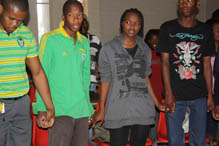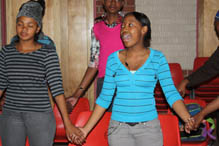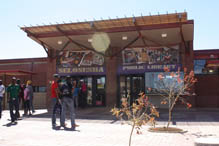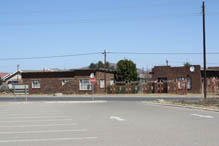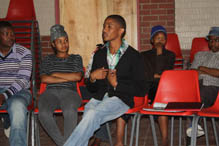
Lehlohonolo Nkate facilitating the Thaba Nchu conversation
September 10, 2010 – Last week the Nelson Mandela Foundation’s dialogue team hosted another community conversation in the series on HIV/AIDS at the Selosesha Library in the Free State town of Thaba Nchu.
The aim of this conversation was to get community members to reflect on what they have achieved to date in the fight against HIV/AIDS.
Thaba Nchu is a small, friendly town located at the foot of a mountain known to the Sesotho-speaking people as “Thaba Ntsho”, meaning “black mountain”. The town, which was founded in 1873, is situated 65km from Bloemfontein along the N8, and 12km from Botshabelo.
Building community capacity - stimulating change
At the September 3, 2010 community conversation in Thaba Nchu, the 89 participants used the “reflections” tool of the participatory monitoring and evaluation process to share their stories about the fight against HIV/AIDS.
In the process of reflecting on and sharing experiences, one member of the community said: “Losing a sister to HIV/AIDS made me want to learn about the pandemic. Change is something that I long for.
“I believe that the little that we do may not necessarily change the world, but [it] could change the perspectives of those around you.”
Another community member spoke about the importance of being true to oneself: “Immediately one starts being honest with oneself, is where we start having change.”
Reflecting on what motivated him, a community member said his late mother had woven the spirit to succeed into his soul.
“My background and family make me want to be a better person and also fill the role that my mother played in our lives,” he explained.
Another community member said: “We all know that HIV/AIDS exists. We need to learn more about it and understand it better.”
In concluding, facilitator Lehlohonolo Magae said he was happy that the exercise had allowed community members to reflect on the role they were playing – as members of the community – in the fight against HIV/AIDS.
“This exercise evoked emotions within all of us,” said Magae. “Now we know our role in this struggle.”
Participants were enthusiastic about meeting up for the next conversation, on September 23, 2010.
Reflections
“The conversation was nice and impressive. I am motivated and hoping to do more in my line of work. I think community conversations should continue because they are good for the youth. Since they were introduced to this community I have seen a lot of changes in the youth; they have changed for the better.
“Some older people are now more interested in community conversations. They are asking us about these gatherings we have at the library.” – Gift Lephalo, Youth Activation Organisation
“This was my first conversation. It was held in a conducive environment which lets young people open up and I learnt a lot of wonderful things today. I think conversations should carry on, and people need to attend these conversations. This is a superb initiative.
“Our community is growing and there has been a lot of negativity. The community conversations bring a lot of light and positivity to Thaba Nchu for young people to empower themselves. It brings a lot of openness. We need to get the community [together] in an environment where young people can speak openly about our issues.” – Matsheka Matsheka, Chairperson, Youth in Power
“I first heard of this [conversation] at one of the [adult basic education and training] classes I teach. I was motivated to come because it was for the youth and they have so many challenges. I wanted to be a part of something that could help them.
“At the first one I attended, we discussed how we could prevent crime. The way I saw the youth open up and share motivated me to get the youth from the church to come, and to open up and talk and not to be shy. They have problems but have no one to share with.” – Sister Dimakatso Kere, St Francis Roman Catholic Church
“I think that in life we need to know about various things, especially HIV/AIDS, so that we can help HIV-positive people because we live with them. My sister has the virus and I know how to deal with her – that’s why I come here, to get more information.” – Motsejwa Faba, Student
“The older females don’t take it seriously and they should. If Thaba Nchu as a whole could get together to find solutions, it would help.” – Bogosi Katane, Co-ordinator, Ward 43

